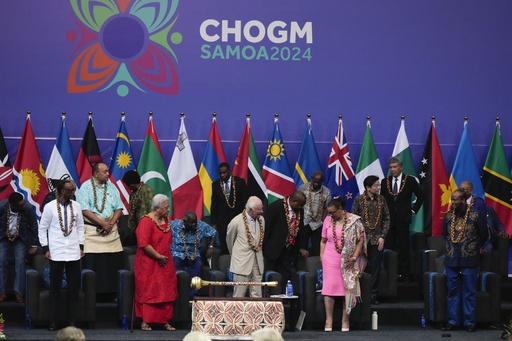WELLINGTON, New Zealand — At a Commonwealth summit in Samoa, King Charles III acknowledged the unresolved issues stemming from Britain’s historical involvement in the trans-Atlantic slave trade. During his address on Friday in Apia, he recognized that the painful elements of this past continue to resonate deeply, although he did not directly engage with calls for financial reparations from several leaders.
Charles urged leaders of the Commonwealth to embrace the “right language” and develop an understanding of their shared history, which he believes is essential for addressing current inequalities. “While we cannot alter the past, we can wholeheartedly commit to learning from it and finding innovative ways to rectify the inequalities that persist,” he remarked. This summit marks his inaugural Commonwealth Heads of Government Meeting as the official head of state of Britain.
His statements mirrored the stance taken by British Prime Minister Keir Starmer the day prior, who suggested the summit should not get bogged down in lengthy discussions about past wrongs and reparations. Starmer dismissed requests from Caribbean representatives for explicit dialogue on reparations and their inclusion in the final statements of the summit, emphasizing the need to focus forward.
The issue of Britain’s involvement in the slave trade has become increasingly significant, as various other European nations and UK institutions have started to acknowledge their roles in these historical injustices. Jacqueline McKenzie, from a London law firm, stated that there is a pressing need for serious discussions concerning reparations, even if it doesn’t entail paying back every penny.
Addressing the financial implications, McKenzie indicated that such measures could cause both significant costs and divisions domestically. The U.K. has not formally apologized for the legacies of the trans-Atlantic slave trade, during which millions of Africans were forcibly taken to work on plantations in the Caribbean and the Americas, enriching numerous individuals and corporations in the process. Financial analyses suggest that Britain could owe amounts ranging from hundreds of millions to trillions of dollars in reparations to the descendants of enslaved individuals.
Bahamas Prime Minister Philip Davis expressed a desire for an open dialogue with Starmer regarding reparations, stating he would advocate for the inclusion of this topic in the leaders’ final communiqué. Notably, candidates vying for the next Commonwealth Secretary-General, hailing from Gambia, Ghana, and Lesotho, all support reparatory policies related to slavery.
Despite Starmer’s assertion that reparations would not be a subject of discussion at the summit, Commonwealth Secretary-General Patricia Scotland later indicated that leaders have the freedom to address any topic they wish during an all-day private meeting scheduled for Saturday.
In his speech, King Charles emphasized the importance of fostering opportunity within the Commonwealth, asserting that advocating for equality is paramount. He encouraged leaders to lean into a language of community and respect, while steering away from divisive rhetoric.
Previously, Charles had expressed his sorrow regarding slavery during a CHOGM summit in 2022, and he supported an inquiry into how the monarchy may have been linked to the slave trade industry.
Currently, King Charles, who has been dealing with health challenges, alongside Queen Camilla, is concluding his visit to Samoa and Australia, following protests from local lawmakers concerning Britain’s colonial past. He also took a moment to honor the legacy of his late mother, Queen Elizabeth II, highlighting her belief in the significance of the Commonwealth as a unifying entity among its diverse member states.
The controversy surrounding reparations has the potential to overshadow discussions that Pacific leaders and Commonwealth representatives have hoped would center on the urgent issues related to climate change. The king highlighted the immediate impact of climate disruptions, referencing numerous natural disasters occurring this year, including violent storms in the Caribbean and severe flooding in East Africa.
Charles called for decisive action against climate change, emphasizing the need to reduce emissions, build resilience, and restore natural environments. Samoa holds the distinction of being the first Pacific Island nation to host this significant gathering, with Prime Minister Fiam? Naomi Mata’afa pointing out in her speech the vital opportunity for global leaders to understand the realities faced by Pacific communities affected by climate change, which she identified as the most pressing threat to their survival.
The Commonwealth, a 75-year-old organization, is made up of 56 member states, representing a combined population of approximately 2.7 billion people, with two dozen of its members being small island nations particularly vulnerable to the consequences of rising sea levels.


